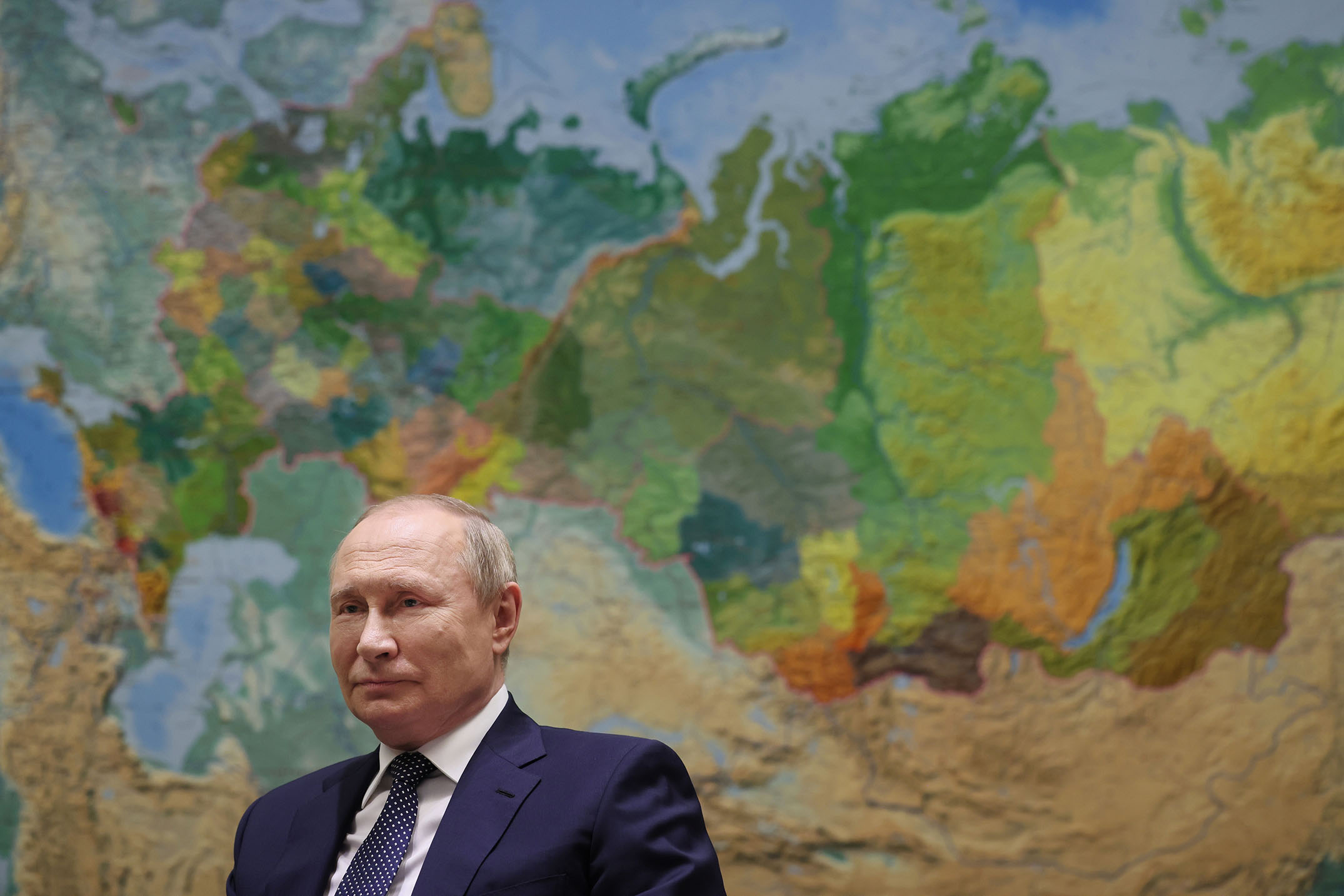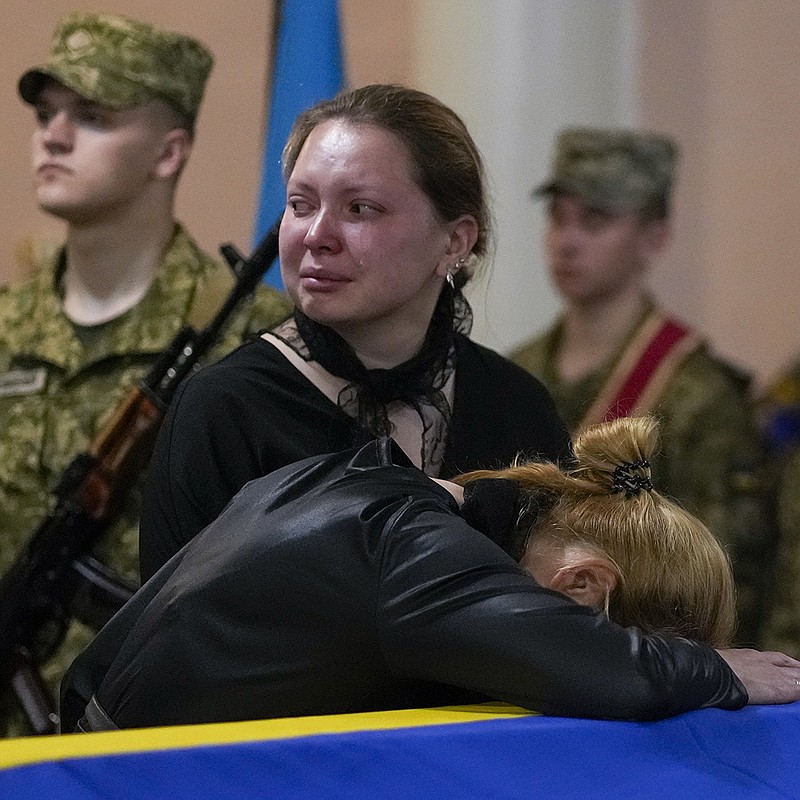One hundred days into Russia's invasion of Ukraine, the war has brought the world a near-daily drumbeat of gut-wrenching scenes: Civilian corpses in the streets of Bucha; a blown-up theater in Mariupol; the chaos at a Kramatorsk train station in the wake of a Russian missile strike.
Before sunrise on Feb. 24, Russia launched artillery strikes and sent troops racing toward major cities, beginning a war against a much smaller country and outnumbered military that seemed destined to quickly topple the government in Kyiv.
But the invasion has ripped apart those predictions, reawakening old alliances, testing others and spreading death and destruction across the country. Both armies are now locked in bloody battles across a 600-mile-long front for control of Ukraine's east, trying to gain the upper hand in the conflict.
The winner, if there is one, is not likely to emerge even in the next 100 days, analysts say. Some foresee an increasingly intractable struggle in eastern Ukraine and a growing confrontation between President Vladimir Putin of Russia and the West.
New Western arms promised to Ukraine -- such as long-range missiles announced by President Joe Biden this week -- could help it reclaim some towns, which would be significant for civilians in those areas, said Ian Bremmer, president of the Eurasia Group, a political risk consulting organization. But they are unlikely to dramatically alter the course of the war, he said.
Squeezed by tightening Western sanctions, Russia, he said, was likely to retaliate with cyberattacks, espionage and disinformation campaigns. And a Russian naval blockade of Ukrainian grain is likely to worsen a food crisis in poor countries.
"What we're looking at now is what the war in Ukraine is likely to look like in 100 days: not radically different," Bremmer said. "But I think the confrontation with the West has the potential to be significantly worse."
President Volodymyr Zelenskyy of Ukraine said defiantly Friday that "victory will be ours," and noted overnight that 50 foreign embassies had resumed "their full-fledged activities" in Kyiv, a sign of the fragile sense of normalcy returning to the capital.
Nevertheless, more than three months into a war that has radically altered Europe's security calculus, killed thousands on both sides, displaced millions of people and spurred a humanitarian crisis, Russian forces now control one-fifth of the country -- an area greater than the Netherlands, Belgium and Luxembourg combined.
Asked during a briefing with reporters what Russia had achieved in Ukraine after 100 days, presidential spokesperson Dmitry Peskov said that many populated areas had been "liberated" from the Ukrainian military, which he described as "Nazi-minded," doubling down on a false narrative the Kremlin has used to justify the invasion.
The International Committee of the Red Cross said Friday that the invasion had caused destruction that "defies comprehension," adding, "It would be hard to exaggerate the toll that the international armed conflict in Ukraine has had on civilians over the last 100 days."
More than 4,000 civilians have been killed since the invasion began, according to U.N. estimates. Ukrainian officials place the death toll much higher.
The war has also set off the largest exodus of refugees in Europe since World War II. More than 8 million Ukrainians have been internally displaced, and more than 6.5 million have fled to other countries, according to the United Nations.
Half of Ukraine's businesses have closed and 4.8 million jobs have been lost. The U.N. estimates that the country's economic output will fall by half this year. Ninety percent of the population risks falling near or below the poverty line. At least $100 billion in damage has been done to infrastructure.
"We may not have enough weapons, but we are resisting," said Oleh Kubrianov, a Ukrainian soldier who lost his right leg fighting near the front line as he lay in a hospital bed. He still had shrapnel lodged in his neck. "There are many more of us, and we are motivated, and convinced by our victory," he said.
Indeed, a recent poll found that almost 80% of Ukrainians believe the country is "moving in the right direction."
"The idea of Ukrainian identity expanded," said Volodymyr Yermolenko, a Ukrainian writer, describing the national sentiment. "More people feel themselves Ukrainian, even those who were doubting their Ukrainian and European identity."
RUSSIA SUFFERING
Russia, too, is suffering from the invasion, geopolitically isolated and facing years of economic dislocation. Its banks have been cut off from Western finance, and with oil production already off by 15%, it is losing energy markets in Europe. Its industries are grappling with developing shortages of basic materials, spare parts and high-tech components.
The decisions by Finland and Sweden to abandon more than 70 years of neutrality and apply for membership in NATO have underscored the disastrous strategic costs of the invasion for Russia.
Major Western companies like McDonald's, Starbucks and Nike have vanished, ostensibly to be replaced by Russian brands. With nearly 1,000 foreign companies having left, some consumers have felt the difference as stocks ran low.
While existing stocks have kept much of the country ticking, Russia will soon have much more of a Soviet feel, reverting to an era when Western goods were nonexistent. Some importers will make a fortune bringing in everything from jeans to iPhones to spare engine parts, but the country will become much more self-contained.
"In Russia, the most important economic thing in the last 100 days is that Putin and the elite firmly settled on an autocratic, isolationist course, and the wider elite and public seem supportive," said Konstantin Sonin, a Russian economist at the University of Chicago.
GLOBAL REPERCUSSIONS
The war is reverberating globally as well. On Friday, Senegalese President Macky Sall, chair of the African Union, appealed directly to Putin to release Ukraine's grain as countries across Africa and the Middle East face alarming levels of hunger and starvation.
At a news conference with Putin in the Black Sea resort of Sochi, Russia, Sall also blamed Western sanctions on Russia for compounding Africa's food crisis.
"Our countries, although they are far from the theater," Sall said, "are victims of this crisis on an economic level."
Tens of millions of people in Africa are on the brink of severe hunger and famine.
On Friday, Chad, a landlocked nation of 17 million people, declared a food emergency, and the United Nations has warned that nearly one-third of the country's population would need humanitarian assistance this year.
PEACE NOWHERE
For now, peace in Ukraine appears to be nowhere in sight. Bruno Tertrais, deputy director of the Paris-based Foundation for Strategic Research, said both sides could become bogged down for months or years in a war of "positions," rather than movement.
"This is not a bad scenario for Russia, which would maintain its country in a state of war and would wait for fatigue to win over the Westerners," Tertrais wrote in a paper for the Institut Montaigne. Russia would already win to some degree, "by putting the occupied regions under its thumb for a long time."
Nevertheless, Tertrais believes a progressive material and moral collapse of the Russian effort remains more probable, given Russian troops' low morale and Ukraine's general mobilization.
Amin Awad, the United Nations' crisis coordinator for Ukraine, said that regardless of who wins the conflict, the toll has been "unacceptable."
"This war has and will have no winner," Awad said in a statement. "Rather, we have witnessed for 100 days what is lost: lives, homes, jobs and prospects."
Nobody really knows how many combatants or civilians have died, and claims of casualties are all but impossible to verify. Government officials, U.N. agencies and others who carry out the grim task of counting the dead don't always get access to places where people were killed.
And Moscow has released scant information about casualties among its forces and allies, and given no accounting of civilian deaths in areas under its control. In some places, Russian forces are accused of trying to cover up deaths and dumping bodies into mass graves, clouding the overall toll.
With all those caveats, "at least tens of thousands" of Ukrainian civilians have died, Zelenskyy said this week -- including those killed by Russian strikes or troops and those who succumbed to secondary effects such as hunger and sickness as food supplies and health services collapsed.
Zelenskyy said 60 to 100 Ukrainian soldiers are dying in combat every day, with about 500 more wounded.
Russia's last publicly released figures for its own forces came in late March, when a general told state media that 1,351 soldiers had been killed and 3,825 wounded.
Ukraine and Western observers say the real number is much higher. Zelenskyy said more than 30,000 Russian servicemen have died -- "more than the Soviet Union lost in 10 years of the war in Afghanistan." In April, the British government estimated Russian losses at 15,000.
Ukraine's ambassador in Geneva, Yevheniia Filipenko, said for her, the 100-day mark is more about the faces of children who lost parents or homes, or the faces of fleeing mothers.
"It's not about the numbers," she said. "It's about the feelings and the sufferings of Ukrainians."
Information for this article was contributed by Valerie Hopkins, Neil MacFarquhar, Steven Erlanger and Michael Levenson of The New York Times and Jamey Keaten and Yuras Karmanau of The Associated Press.
 Russian President Vladimir Putin speaks during an interview with the Russia-1 TV channel Friday in the Bocharov Ruchei residence in the Black Sea resort of Sochi, Russia. Senegalese President Macky Sall, chairman of the African Union, joined Putin in Sochi in blaming the West for emerging global food and energy crises. (AP/Sputnik/Mikhail Klimentyev)
Russian President Vladimir Putin speaks during an interview with the Russia-1 TV channel Friday in the Bocharov Ruchei residence in the Black Sea resort of Sochi, Russia. Senegalese President Macky Sall, chairman of the African Union, joined Putin in Sochi in blaming the West for emerging global food and energy crises. (AP/Sputnik/Mikhail Klimentyev)Gallery: Images from Ukraine, month 4
